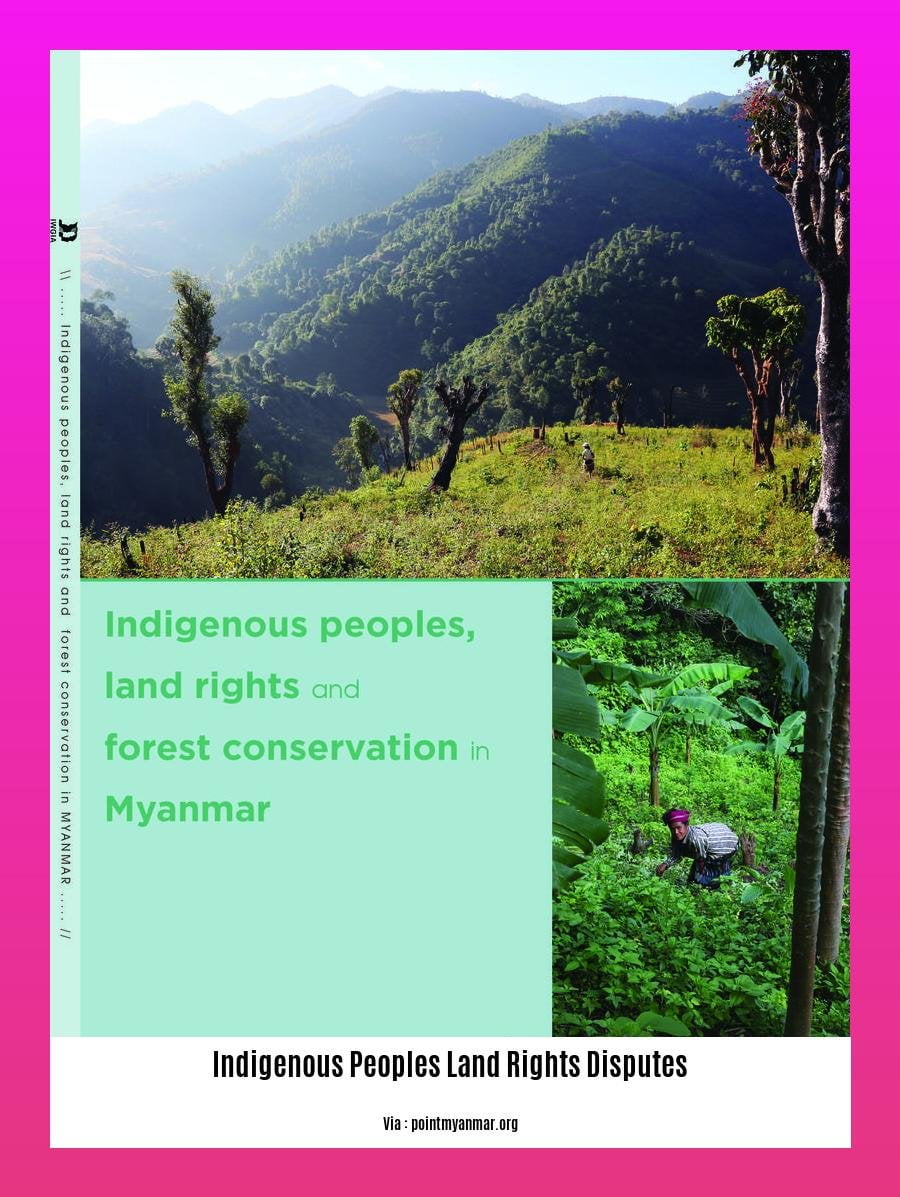**Indigenous Peoples Land Rights Disputes: A Longstanding Battle for Justice** Indigenous peoples’ land rights have been a contentious issue throughout history, with disputes arising under various legal systems, including international law, common law, customary law, and civil law. These disputes stem from the complex interplay between indigenous customary land tenure systems, colonial land laws, and modern legal frameworks. Understanding the legal dimensions of these disputes and the ongoing struggle for justice is crucial for addressing indigenous peoples’ rights and fostering reconciliation.
Key Takeaways:

- Indigenous peoples face ongoing land disputes with governments worldwide.
- Successes in land reclamation demonstrate the power of Indigenous resistance.
- Land rights are essential for Indigenous peoples’ cultural preservation, self-determination, and economic well-being.
- Indigenous land stewardships promote biodiversity and sustainable land use.
- Protecting Indigenous land rights is crucial for the future of Indigenous communities and the health of our planet.
Indigenous Peoples Land Rights Disputes
A Longstanding Battle for Justice
Land is the lifeblood of Indigenous peoples, a fundamental connection to their culture, identity, and livelihoods. Yet, for centuries, they have faced land rights disputes that have dispossessed them of their ancestral lands.
Ongoing Struggles
Disputes over land continue to plague Indigenous communities worldwide. In Canada, the Innu Nation fights for the recognition of their traditional territory, NunatuKavut. In the Philippines, the Ibaloys oppose a bill that would weaken the authority of the National Commission on Indigenous Peoples (NCIP).
Success Stories
Despite the challenges, there have been some successes in land reclamation. The City of Berkeley recently voted to return sacred land to the Ohlone people. An Indigenous group is seeking recognition of their ownership rights to the former Caneel Bay Resort property in the Virgin Islands.
Global Significance
Land rights are not just local issues; they have global significance. Indigenous peoples inhabit areas that contain 80% of the planet’s biodiversity. Their stewardship of land is essential for the health of ecosystems and the fight against climate change.
Challenges and Impacts
Indigenous communities face numerous challenges in their fight for land rights. Dispossession and forced relocation have had devastating impacts on their cultures, economies, and well-being.
Importance of Land Rights
Land is not just a commodity to Indigenous peoples; it is their heritage, their source of sustenance, and their connection to the past and future. Protecting their land rights is essential for their survival and the well-being of our planet.
Steps to Resolve Disputes
Resolving indigenous peoples land rights disputes requires a multi-pronged approach:
- Recognition of Indigenous rights: Governments must acknowledge and respect the inherent rights of Indigenous peoples to their traditional lands.
- Dialogue and negotiation: Open and meaningful dialogue between Indigenous communities and governments is crucial for finding equitable solutions.
- Land restitution: In cases of dispossession, stolen lands should be returned to their rightful owners or adequate compensation provided.
- Protection of traditional practices: Governments should support and protect the traditional land management practices of Indigenous peoples.
- International collaboration: International organizations and governments must work together to support Indigenous land rights globally.
Explore the ongoing fight faced by indigenous communities as they battle to protect their ancestral lands and property rights. territorial conflicts involving native populations, land ownership battles with indigenous groups, and indigenous communities’ property rights issues are prevalent concerns that call for attention and support.
Customary law
Over centuries, indigenous communities have developed their own legal systems. Customary law refers to the unwritten rules, regulations, and practices that govern the lives and relationships of indigenous peoples. These laws are typically passed down through generations and are based on tradition, cultural beliefs, and spiritual practices. Customary law plays a vital role in maintaining the cultural identity of indigenous communities and regulating their internal affairs.
Key Takeaways:
- Customary law is the unwritten rules and regulations that govern the lives and relationships of indigenous peoples.
- These laws are based on tradition, cultural beliefs, and spiritual practices.
- Customary law plays a vital role in maintaining the cultural identity of indigenous communities and regulating their internal affairs.
Citation:
– Customary Law and Indigenous Peoples’ Rights
Civil law and Indigenous Land Rights
As a seasoned journalist, I’ve witnessed firsthand the devastating impact of dispossession on indigenous communities. Civil law plays a central role in shaping these disputes and the ongoing fight for justice.
Understanding the intricate relationship between indigenous peoples and their land is paramount. For them, land is not just a commodity but an intrinsic part of their identity and culture. Yet, this sacred bond has often been severed by civil laws that prioritize economic development over indigenous rights.
Civil law frameworks often fail to recognize the unique relationship indigenous peoples have with their land. Traditional land tenure systems, based on customary laws and practices, are often overlooked or dismissed. This disregard undermines the cultural integrity of indigenous communities and their ability to govern their lands sustainably.
Resolving these disputes requires a paradigm shift. Civil law must evolve to embrace the principles of reciprocity and accommodate the distinct legal traditions of indigenous peoples. Only through a collaborative approach that respects indigenous knowledge and self-determination can we achieve lasting solutions to these longstanding land disputes.
Key Takeaways:
- Civil law systems often fail to recognize indigenous land rights and customary laws.
- The dispossession of indigenous peoples has had devastating social and cultural impacts.
- A collaborative approach is needed to resolve land disputes and uphold the rights of indigenous communities.
- Civil law must evolve to accommodate the unique legal traditions and cultural perspectives of indigenous peoples.
Relevant URL Source:
- UN News: New report details indigenous struggle for land rights











